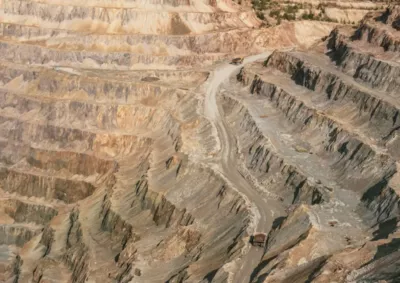NEWS & INSIGHTS: Global Public Health
In the Democratic Republic of Congo (DRC), wealth and hardship are often two sides of the same coin. Nowhere is this more evident than in the complex relationship between cobalt mining, climate change, and public health. Cobalt, a vital component of lithium-ion batteries used in smartphones, electric vehicles, and renewable energy technologies, has propelled the DRC into the global spotlight. While the country’s mining industry has brought economic prosperity, it has also been plagued by numerous challenges.
In this article, we delve deep into the multifaceted repercussions of cobalt mining in the DRC. We explore how the increasing demand for cobalt has led to environmental degradation and exacerbated climate change impacts, including deforestation and water pollution. Moreover, we shed light on the alarming public health consequences faced by local communities, such as respiratory diseases and increased exposure to toxic chemicals.
By understanding the intricate dynamics at play, we can begin to address the urgent need for sustainable solutions that balance economic development with environmental preservation and public health concerns. Join us on this exploration of the interplay between riches, woes, and the urgent need for change in the DRC’s cobalt mining industry.
The Role of Cobalt in Various Industries
Cobalt plays a crucial role in various industries, particularly in the production of lithium-ion batteries. These batteries are essential for powering smartphones, electric vehicles, and renewable energy technologies. As the demand for these products continues to rise, so does the demand for cobalt. However, the extraction of cobalt comes at a significant cost to both the environment and public health in the DRC.
Cobalt mining in the DRC has become a lucrative industry, attracting both local and international investors. The abundance of cobalt reserves in the country has allowed it to become the world’s leading producer. However, this boom in production has come at the expense of the environment, with mining operations causing deforestation, soil erosion, and water pollution. The consequences of these activities are far-reaching and have severe implications for climate change.
The extraction and processing of cobalt emit significant amounts of greenhouse gases, contributing to the already alarming levels of carbon emissions. Additionally, the destruction of forests and the loss of biodiversity result in the loss of natural carbon sinks, further exacerbating global warming. The link between cobalt mining, climate change, and the subsequent impacts on public health cannot be ignored.
Environmental Impact of Cobalt Mining
 The environmental impact of cobalt mining in the DRC is extensive and far-reaching. The extraction process involves open-pit mining, which leads to deforestation and habitat destruction. The loss of forests not only contributes to climate change but also disrupts ecosystems and threatens biodiversity.
The environmental impact of cobalt mining in the DRC is extensive and far-reaching. The extraction process involves open-pit mining, which leads to deforestation and habitat destruction. The loss of forests not only contributes to climate change but also disrupts ecosystems and threatens biodiversity.
Furthermore, cobalt mining generates a significant amount of waste, including toxic tailings, which are often dumped into nearby rivers and water bodies. This practice not only pollutes water sources but also poses a threat to aquatic life and the health of local communities who rely on these water sources for drinking and irrigation.
The mining process also contributes to soil erosion and degradation, making it difficult for vegetation to grow. This loss of vegetation further exacerbates the negative impacts of climate change by reducing the ability of the ecosystem to sequester carbon dioxide and regulate temperature.
READ | Green Finance: The Game-Changer in Climate Action
Climate Change and its Connection to Cobalt Mining
Climate change and cobalt mining are intrinsically linked. The extraction and processing of cobalt release significant amounts of greenhouse gases, primarily in the form of carbon dioxide and methane. These gases contribute to the warming of the planet and the subsequent impacts associated with climate change.
Moreover, the destruction of forests due to cobalt mining reduces the Earth’s natural carbon sinks, which are crucial for mitigating climate change. Forests absorb carbon dioxide from the atmosphere, helping to regulate the global climate. The loss of forests in the DRC not only contributes to increased carbon emissions but also hinders the planet’s ability to combat climate change effectively.
The relationship between cobalt mining and climate change is a vicious cycle. As climate change worsens, extreme weather events such as droughts and floods become more frequent, further disrupting cobalt mining operations and exacerbating the environmental and public health challenges faced by the DRC.
Public Health Issues Associated with Cobalt Mining
The extraction and processing of cobalt pose significant risks to public health in the DRC. The inhalation of toxic dust and fumes during the mining process can lead to respiratory diseases such as silicosis and pneumoconiosis. These diseases, if left untreated, can be debilitating and even fatal.
Additionally, the dumping of toxic tailings into water bodies contaminates local water sources, leading to waterborne diseases and an increased risk of gastrointestinal infections. The use of toxic chemicals, such as sulfuric acid, in the processing of cobalt further compounds the public health risks faced by local communities.
Furthermore, the displacement of communities due to mining activities disrupts access to healthcare facilities and essential services, exacerbating the already fragile healthcare system in the DRC. The combination of these factors creates a perfect storm for public health crises in the affected areas.
The Challenges Faced by Local Communities in the DRC
Local communities in the DRC face numerous challenges due to cobalt mining activities. The displacement of communities to make way for mining operations disrupts their way of life and often leaves them without access to basic necessities such as clean water, healthcare, and education.
Additionally, the influx of workers to mining areas puts a strain on local resources and infrastructure, further exacerbating the challenges faced by communities. The lack of adequate housing, sanitation facilities, and healthcare services in these areas creates an environment conducive to the spread of diseases and other health-related issues.
Furthermore, the economic benefits of cobalt mining often do not reach the local communities directly. The profits generated from mining operations often flow to international corporations and government entities, leaving the communities with little to no benefit from the resources extracted from their land.
Corporate Responsibility and Ethical Sourcing of Cobalt
Addressing the complex relationship between cobalt mining, climate change, and public health requires the collective effort of various stakeholders, including mining companies, governments, and consumers. Corporate responsibility plays a vital role in ensuring that cobalt is sourced ethically and sustainably.
Mining companies must prioritize environmental preservation and public health in their operations. This includes implementing measures to minimize environmental impact, such as reforestation and proper waste management. Additionally, companies must prioritize the health and safety of their workers and the local communities, providing access to healthcare and clean water.
Governments also have a responsibility to enforce regulations and monitor mining activities to ensure compliance with environmental and health standards. This includes holding mining companies accountable for their actions and implementing policies that promote sustainable mining practices.
Consumers can contribute to the solution by demanding transparency and ethical sourcing of cobalt in the products they purchase. By supporting companies that prioritize sustainability and social responsibility, consumers can create a demand for responsibly sourced cobalt and drive change in the industry.
Initiatives and Solutions Addressing the Complex Relationship
Various initiatives and solutions are being implemented to address the complex relationship between cobalt mining, climate change, and public health in the DRC. The Responsible Cobalt Initiative, for example, aims to promote responsible sourcing and production of cobalt. This initiative brings together industry stakeholders, including mining companies, to develop and implement best practices.
Furthermore, international organizations such as the United Nations are working with governments and mining companies to develop sustainable mining guidelines and promote responsible mineral supply chains. These initiatives aim to ensure that cobalt mining benefits local communities and protects the environment.
Investment in renewable energy technologies and the development of alternative battery technologies that reduce or eliminate the need for cobalt are also crucial in mitigating the negative impacts of cobalt mining. By reducing the demand for cobalt, we can lessen the pressure on mining operations and promote sustainable practices.
The Future of Cobalt Mining and its Impact on Climate Change and Public Health
The future of cobalt mining in the DRC lies in striking a balance between economic development, environmental preservation, and public health. It is essential to develop sustainable mining practices that minimize environmental impact and prioritize the health and well-being of local communities.
Investment in renewable energy technologies and the development of alternative battery technologies will play a crucial role in reducing the demand for cobalt and mitigating the negative impacts associated with its extraction. By diversifying our energy sources and reducing our reliance on cobalt-dependent technologies, we can create a more sustainable and equitable future.
However, the transformation of the cobalt mining industry will require collaboration and commitment from all stakeholders involved. Governments, mining companies, consumers, and international organizations must work together to develop and implement sustainable solutions that address the complex relationship between cobalt mining, climate change, and public health.
Conclusion: The Need for Sustainable Practices in the Cobalt Industry
The complex relationship between cobalt mining, climate change, and public health in the DRC demands urgent attention and action. The extraction and processing of cobalt have significant environmental and public health consequences that cannot be ignored.
To address these challenges, sustainable practices must be implemented throughout the cobalt supply chain. This includes responsible sourcing, proper waste management, and the prioritization of environmental preservation and public health. Furthermore, investment in renewable energy technologies and alternative battery technologies will play a crucial role in reducing the demand for cobalt and mitigating its negative impacts.
By understanding the intricate dynamics at play and working together to find sustainable solutions, we can create a future where cobalt mining supports economic development without compromising the environment and public health. The time for change is now, and it is our collective responsibility to ensure a better future for the DRC and the world.
Share This Post, Choose Your Platform!
In the Democratic Republic of Congo (DRC), wealth and hardship are often two sides of the same coin. Nowhere is this more evident than in the complex relationship between cobalt mining, climate change, and public health. Cobalt, a vital component of lithium-ion batteries used in smartphones, electric vehicles, and renewable energy technologies, has propelled the DRC into the global spotlight. While the country’s mining industry has brought economic prosperity, it has also been plagued by numerous challenges.
In this article, we delve deep into the multifaceted repercussions of cobalt mining in the DRC. We explore how the increasing demand for cobalt has led to environmental degradation and exacerbated climate change impacts, including deforestation and water pollution. Moreover, we shed light on the alarming public health consequences faced by local communities, such as respiratory diseases and increased exposure to toxic chemicals.
By understanding the intricate dynamics at play, we can begin to address the urgent need for sustainable solutions that balance economic development with environmental preservation and public health concerns. Join us on this exploration of the interplay between riches, woes, and the urgent need for change in the DRC’s cobalt mining industry.
The Role of Cobalt in Various Industries
Cobalt plays a crucial role in various industries, particularly in the production of lithium-ion batteries. These batteries are essential for powering smartphones, electric vehicles, and renewable energy technologies. As the demand for these products continues to rise, so does the demand for cobalt. However, the extraction of cobalt comes at a significant cost to both the environment and public health in the DRC.
Cobalt mining in the DRC has become a lucrative industry, attracting both local and international investors. The abundance of cobalt reserves in the country has allowed it to become the world’s leading producer. However, this boom in production has come at the expense of the environment, with mining operations causing deforestation, soil erosion, and water pollution. The consequences of these activities are far-reaching and have severe implications for climate change.
The extraction and processing of cobalt emit significant amounts of greenhouse gases, contributing to the already alarming levels of carbon emissions. Additionally, the destruction of forests and the loss of biodiversity result in the loss of natural carbon sinks, further exacerbating global warming. The link between cobalt mining, climate change, and the subsequent impacts on public health cannot be ignored.
Environmental Impact of Cobalt Mining
 The environmental impact of cobalt mining in the DRC is extensive and far-reaching. The extraction process involves open-pit mining, which leads to deforestation and habitat destruction. The loss of forests not only contributes to climate change but also disrupts ecosystems and threatens biodiversity.
The environmental impact of cobalt mining in the DRC is extensive and far-reaching. The extraction process involves open-pit mining, which leads to deforestation and habitat destruction. The loss of forests not only contributes to climate change but also disrupts ecosystems and threatens biodiversity.
Furthermore, cobalt mining generates a significant amount of waste, including toxic tailings, which are often dumped into nearby rivers and water bodies. This practice not only pollutes water sources but also poses a threat to aquatic life and the health of local communities who rely on these water sources for drinking and irrigation.
The mining process also contributes to soil erosion and degradation, making it difficult for vegetation to grow. This loss of vegetation further exacerbates the negative impacts of climate change by reducing the ability of the ecosystem to sequester carbon dioxide and regulate temperature.
READ | Green Finance: The Game-Changer in Climate Action
Climate Change and its Connection to Cobalt Mining
Climate change and cobalt mining are intrinsically linked. The extraction and processing of cobalt release significant amounts of greenhouse gases, primarily in the form of carbon dioxide and methane. These gases contribute to the warming of the planet and the subsequent impacts associated with climate change.
Moreover, the destruction of forests due to cobalt mining reduces the Earth’s natural carbon sinks, which are crucial for mitigating climate change. Forests absorb carbon dioxide from the atmosphere, helping to regulate the global climate. The loss of forests in the DRC not only contributes to increased carbon emissions but also hinders the planet’s ability to combat climate change effectively.
The relationship between cobalt mining and climate change is a vicious cycle. As climate change worsens, extreme weather events such as droughts and floods become more frequent, further disrupting cobalt mining operations and exacerbating the environmental and public health challenges faced by the DRC.
Public Health Issues Associated with Cobalt Mining
The extraction and processing of cobalt pose significant risks to public health in the DRC. The inhalation of toxic dust and fumes during the mining process can lead to respiratory diseases such as silicosis and pneumoconiosis. These diseases, if left untreated, can be debilitating and even fatal.
Additionally, the dumping of toxic tailings into water bodies contaminates local water sources, leading to waterborne diseases and an increased risk of gastrointestinal infections. The use of toxic chemicals, such as sulfuric acid, in the processing of cobalt further compounds the public health risks faced by local communities.
Furthermore, the displacement of communities due to mining activities disrupts access to healthcare facilities and essential services, exacerbating the already fragile healthcare system in the DRC. The combination of these factors creates a perfect storm for public health crises in the affected areas.
The Challenges Faced by Local Communities in the DRC
Local communities in the DRC face numerous challenges due to cobalt mining activities. The displacement of communities to make way for mining operations disrupts their way of life and often leaves them without access to basic necessities such as clean water, healthcare, and education.
Additionally, the influx of workers to mining areas puts a strain on local resources and infrastructure, further exacerbating the challenges faced by communities. The lack of adequate housing, sanitation facilities, and healthcare services in these areas creates an environment conducive to the spread of diseases and other health-related issues.
Furthermore, the economic benefits of cobalt mining often do not reach the local communities directly. The profits generated from mining operations often flow to international corporations and government entities, leaving the communities with little to no benefit from the resources extracted from their land.
Corporate Responsibility and Ethical Sourcing of Cobalt
Addressing the complex relationship between cobalt mining, climate change, and public health requires the collective effort of various stakeholders, including mining companies, governments, and consumers. Corporate responsibility plays a vital role in ensuring that cobalt is sourced ethically and sustainably.
Mining companies must prioritize environmental preservation and public health in their operations. This includes implementing measures to minimize environmental impact, such as reforestation and proper waste management. Additionally, companies must prioritize the health and safety of their workers and the local communities, providing access to healthcare and clean water.
Governments also have a responsibility to enforce regulations and monitor mining activities to ensure compliance with environmental and health standards. This includes holding mining companies accountable for their actions and implementing policies that promote sustainable mining practices.
Consumers can contribute to the solution by demanding transparency and ethical sourcing of cobalt in the products they purchase. By supporting companies that prioritize sustainability and social responsibility, consumers can create a demand for responsibly sourced cobalt and drive change in the industry.
Initiatives and Solutions Addressing the Complex Relationship
Various initiatives and solutions are being implemented to address the complex relationship between cobalt mining, climate change, and public health in the DRC. The Responsible Cobalt Initiative, for example, aims to promote responsible sourcing and production of cobalt. This initiative brings together industry stakeholders, including mining companies, to develop and implement best practices.
Furthermore, international organizations such as the United Nations are working with governments and mining companies to develop sustainable mining guidelines and promote responsible mineral supply chains. These initiatives aim to ensure that cobalt mining benefits local communities and protects the environment.
Investment in renewable energy technologies and the development of alternative battery technologies that reduce or eliminate the need for cobalt are also crucial in mitigating the negative impacts of cobalt mining. By reducing the demand for cobalt, we can lessen the pressure on mining operations and promote sustainable practices.
The Future of Cobalt Mining and its Impact on Climate Change and Public Health
The future of cobalt mining in the DRC lies in striking a balance between economic development, environmental preservation, and public health. It is essential to develop sustainable mining practices that minimize environmental impact and prioritize the health and well-being of local communities.
Investment in renewable energy technologies and the development of alternative battery technologies will play a crucial role in reducing the demand for cobalt and mitigating the negative impacts associated with its extraction. By diversifying our energy sources and reducing our reliance on cobalt-dependent technologies, we can create a more sustainable and equitable future.
However, the transformation of the cobalt mining industry will require collaboration and commitment from all stakeholders involved. Governments, mining companies, consumers, and international organizations must work together to develop and implement sustainable solutions that address the complex relationship between cobalt mining, climate change, and public health.
Conclusion: The Need for Sustainable Practices in the Cobalt Industry
The complex relationship between cobalt mining, climate change, and public health in the DRC demands urgent attention and action. The extraction and processing of cobalt have significant environmental and public health consequences that cannot be ignored.
To address these challenges, sustainable practices must be implemented throughout the cobalt supply chain. This includes responsible sourcing, proper waste management, and the prioritization of environmental preservation and public health. Furthermore, investment in renewable energy technologies and alternative battery technologies will play a crucial role in reducing the demand for cobalt and mitigating its negative impacts.
By understanding the intricate dynamics at play and working together to find sustainable solutions, we can create a future where cobalt mining supports economic development without compromising the environment and public health. The time for change is now, and it is our collective responsibility to ensure a better future for the DRC and the world.




